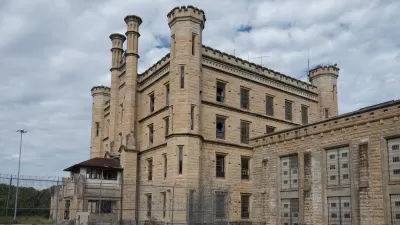The good news - America is closing its prisons. The bad news - America is closing its prisons. Emily Badger asks how "all these empty, peculiar and often isolated buildings" can be reused.
After decades of continuous growth, America's prison population declined in 2009, and has continued to decline since, owing to "a fundamental shift in thinking about prisons by the public, politicians and public safety professionals." In turn, it will be the job of designers, planners, and public officials to think about just what can be done with the dozens of prisons - which "were built to be bedrock-secure" and "to serve a purpose unlike any other building genre" - now being closed across the country.
"There are a handful of examples already in the U.S. of historic urban facilities more easily repurposed, or prisons and jails converted into the low-hanging fruit of the reuse field: mini-storage facilities for stuff instead of people," notes Badger. But many of these facilities were built in rural communities. Finding a new use for them will be a particular challenge.
DNA labs; server farms; offsite homes for museum collections - these are just some of the ideas being explored. Yet, says Badger, "[e]ducational facilities in rural communities might be one of the best ideas."
"Rural towns were often sold on prisons as a kind of economic stimulus. They represented not criminals coming to town, but jobs, and just as manufacturing and agricultural work was disappearing. Today, prison closings offer an opportunity to rethink the economies of these places, and to thoughtfully include local communities in the planning process in a way that did not happen when these mega-facilities were sighted there in the first place."
FULL STORY: America Is Finally Closing Prisons. Now What Do We Do With Them?

Alabama: Trump Terminates Settlements for Black Communities Harmed By Raw Sewage
Trump deemed the landmark civil rights agreement “illegal DEI and environmental justice policy.”

Study: Maui’s Plan to Convert Vacation Rentals to Long-Term Housing Could Cause Nearly $1 Billion Economic Loss
The plan would reduce visitor accommodation by 25% resulting in 1,900 jobs lost.

Planetizen Federal Action Tracker
A weekly monitor of how Trump’s orders and actions are impacting planners and planning in America.

Waymo Gets Permission to Map SF’s Market Street
If allowed to operate on the traffic-restricted street, Waymo’s autonomous taxis would have a leg up over ride-hailing competitors — and counter the city’s efforts to grow bike and pedestrian on the thoroughfare.

Parklet Symposium Highlights the Success of Shared Spaces
Parklets got a boost during the Covid-19 pandemic, when the concept was translated to outdoor dining programs that offered restaurants a lifeline during the shutdown.

Federal Homelessness Agency Places Entire Staff on Leave
The U.S. Interagency Council on Homelessness is the only federal agency dedicated to preventing and ending homelessness.
Urban Design for Planners 1: Software Tools
This six-course series explores essential urban design concepts using open source software and equips planners with the tools they need to participate fully in the urban design process.
Planning for Universal Design
Learn the tools for implementing Universal Design in planning regulations.
Caltrans
Smith Gee Studio
Institute for Housing and Urban Development Studies (IHS)
City of Grandview
Harvard GSD Executive Education
Toledo-Lucas County Plan Commissions
Salt Lake City
NYU Wagner Graduate School of Public Service





























